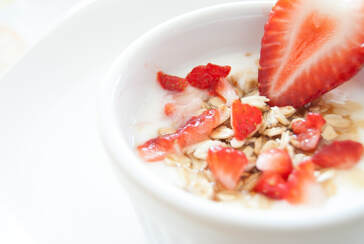 Most of you know me as Ms. Angela who tutors your children in our family owned tutoring business. What you might not know is that I am also a Nutritherapy Practitioner. As predominantly a behavioural nutritionist, I have helped many people understand their relationship with food, putting them on the path to better nutritional choices and better health. Today, I am going to share with you my thoughts about whether or not your child (or even adults) should eat breakfast. Studies overwhelmingly show that when children eat breakfast their concentration improves; they get better test scores; they have increased energy; they are more likely to enjoy a healthier body weight; and they are more likely to participate in physical activities. Did you know that half of a young student's energy is used by the brain? Children have a high metabolic turnover and a rapid growth rate. In addition, children tend to sleep longer hours than adults, so they are in a fasting state for a longer period of time. Consequently, they need breakfast to do exactly what "breakfast" means and that is "break the fast." Numerous studies have shown that skipping breakfast can lead to an increased risk of obesity with that obesity extending into adulthood. Obesity in adulthood, as we know, can lead to many problems such as type 2 diabetes, cardiovascular disease, stroke, high blood pressure, high cholesterol, cancer, et cetera. Are all breakfasts equal? No, they are not. Always include a healthy source of protein. Protein helps build and repair cells. It is important for growth and development. It also helps you feel full longer (satiating). If you don't get enough protein you might feel more fatigued and have poor concentration. Also, choose foods higher in fibre. Not only does fibre aid with digestion, but it also helps keep blood sugar and insulin levels steady. Too many simple carbohydrates like white bread, white pasta, plain sugar, sugary foods (pastries, muffins, sugary cereals) cause the body to think that it has too much energy (increases blood sugar and insulin levels) because these foods are rapidly digested. The body uses the energy it needs but converts the rest to fat. Because higher fibre foods are not easy to digest, blood sugar and insulin surges do not happen. Want to keep your child enthusiastic about breakfast? Don't serve the same breakfast everyday. Get your child involved in the preparation process. Make sure your child wakes up with enough time to sit and eat. Get your child's input on what he/she would like to eat. Find some make-ahead recipes that you can make with your child, freeze, and then reheat when needed. I say yes to breakfast. Wishing everyone a wonderful school year. Angela
2 Comments
|
Angela BairdMother. Wife. Sister. Friend. Teacher. Tutor. Nutritionist. Mentor. Speaker. Archives
February 2023
Categories |
Site Links |
|
Site powered by Weebly. Managed by FreeLogoServices.com

 RSS Feed
RSS Feed